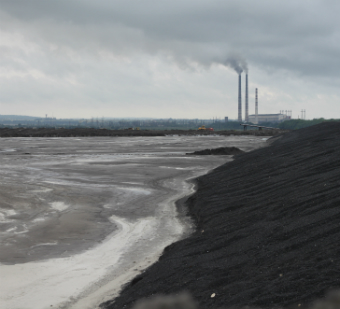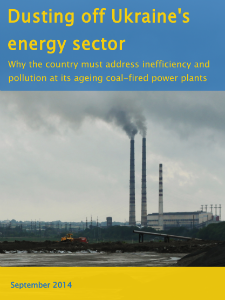Currently presiding over the EU-backed Energy Community’s Minsterial Council, Ukraine will likely try to dilute environmental regulations in the Treaty. But the country’s ageing coal-fired power plants are troubled by inefficiency and pollution and in dire need of environmental improvements.
Ioana Ciuta, Energy campaign coordinator | 23 September 2014

Today, Energy and Economy Ministers of the eight signatory countries of the Energy Community Treaty [1], along with the EU Commissioner for Energy, are holding their annual meeting – the Ministerial Council – in Kiev, Ukraine.
There are two points on today’s agenda (pdf) in which Ukraine, currently holding the presidency of the Ministerial Council, has an instrumental role and whose outcomes we are particularly concerned about.
One will be a discussion of Ukraine’s commitments to reduce emissions from coal fired power plants, which, under the current Energy Community provisions, should take place by the end of 2027. This deadline which had already been moved from January 2018 to December 2027 is very accommodating for Energy Community countries, compared with the 2016 deadline applicable in the EU member states (for existing coal-fired plants).
However, Ukraine is proposing yet another extension of this deadline until 2033. Basically, the Ukrainian government would like to continue with the “business-as-usual” operation of its already old and inefficient coal power plant fleet for almost 20 more years from now.
New report
Why Ukraine must address inefficiency and pollution at its ageing coal-fired power plants
This proposal comes from a country where none of the coal-fired power plants have any pollution control for sulphur (SOx) or nitrogen oxide (NOx) and where dust emissions are up to 45 times above the exceed limits of the EU’s Large Combustion Plants Directive (LCPD). Basically, none of these plants would be allowed to operate in any EU country because of their emissions, or would have a strict deadline for closure.
The urgent need for reform in Ukraine’s energy sector and the opportunities that the Energy Community membership brings in this regard are explained in more detail in the new Bankwatch report (pdf) “Dusting off Ukraine’s energy sector – Why the country must address inefficiency and pollution at its ageing coal-fired power plants”. It is based on a field trip to two coal power plants and communities Western Ukraine, and highlights some of the pollution challenges of energy generation from coal in Ukraine.
Allowing Ukraine to further postpone emission reductions would not only prolong the avoidable pollution under which local communities have to suffer but could create a dangerous double standard for the implementation of energy legislation on the one hand and environmental legislation on the other hand.
A common energy market for the EU and the Energy Community that does not privilege environmentally damaging electricity sources is only possible when environmental regulations are not allowed to take the backseat. Already now two power plants in western Ukraine are connected to the European electricity grid and export some 55% of their output to Hungary, Slovakia, Romania and Poland, while creating tremendous air pollution and health problems for the people living close to the plants. It would be inexcusable for the Energy Community to allow this to continue for another 20 years.
Environmental provisions in the future Treaty
Also on the Ministerial Council’s agenda for today is the Treaty’s revision and extension until 2026. Proposals that the Energy Community members should adopt more of the EU’s environmental legislation are not given a warm welcome by some of the member countries, including Ukraine that is now leading the discussions.
Earlier this year, the final report (pdf) of an expert group that reviewed the Energy Community’s set-up and working methods suggested several concrete reforms, among them “best available techniques” requirements for power plants, public procurement in the energy sector and ambient air quality regulation.
The governments of Energy Community members will today try to establish a roadmap for 2015 for deciding on these and other proposals for the future of their energy sectors.
It is an important turning point for the Energy Community in which environmental improvements should not be sacrificed.
Notes
1. The Energy Community brings together Albania, Bosnia and Herzegovina, Kosovo, Macedonia, Moldova, Montenegro, Serbia and Ukraine – and soon also Georgia – with the stated goal of extending EU internal energy policy to south east Europe and the Black Sea region. The Energy Community Treaty sets out, among others, which energy-related parts of EU legislation have to be adopted by the participating countries.
Never miss an update
We expose the risks of international public finance and bring critical updates from the ground – straight to your inbox.
Theme: Energy & climate
Location: Ukraine
Tags: Burshtyn | Dobrotvir | Energy Community | Ukraine | coal | derogations | energy | energy exports | environmental aquis | inefficiency | pollution

